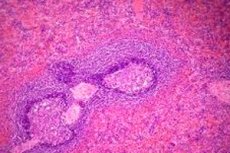New publications
The spleen produces antibodies under the guidance of the brain
Last reviewed: 02.07.2025

All iLive content is medically reviewed or fact checked to ensure as much factual accuracy as possible.
We have strict sourcing guidelines and only link to reputable media sites, academic research institutions and, whenever possible, medically peer reviewed studies. Note that the numbers in parentheses ([1], [2], etc.) are clickable links to these studies.
If you feel that any of our content is inaccurate, out-of-date, or otherwise questionable, please select it and press Ctrl + Enter.

In a stressful situation, the brain activates the formation of cells that produce anti-infective antibodies.
One of the functions of the spleen is to help immunocytes synthesize antibodies. Antibodies are produced by plasma cells, which are cells that emerge from B lymphocytes. In order for this transformation to occur, B lymphocytes must receive a “sign” from T lymphocytes: they inform the cells about the penetration of a foreign agent into the body after they themselves recognize the presence of foreign molecules, in particular, an infection. At this stage, there is a need for another class of cellular structures - antigen-presenting cells. They capture the “stranger” and introduce it to T lymphocytes, which, in turn, pass this information on to B lymphocytes. At the same time, immunocytes decide what their reaction should be, whether the “stranger” poses a danger to the body. This exchange of information and “signs” occurs in the splenic environment.
The spleen is supplied with nerves that function separately from the brain. However, the spleen is not limited to the autonomic nervous system alone: its work also depends on certain parts of the brain. Scientists from Tsingqua University conducted a study on rodents, blocking the nerves that carry impulses from the brain. After that, the specialists injected the mice with an antigen to potentially activate antibody production, but their level did not increase.
To transform B-lymphocytes into plasma cells that produce antibodies, the action of acetylcholine, a special neurotransmitter, is necessary. However, these same molecules are also released by T-lymphocytes that sense the "foreigner" and become active. T-lymphocytes produce acetylcholine not whenever they want, but under the influence of norepinephrine. Thus, in order for B-structures to be activated by T-structures, the latter must sense the antigen and record the "sign" from norepinephrine.
Scientists note that impulses come to the spleen from the paraventricular hypothalamic nucleus and the central nucleus of the amygdala. Neuronal groups that send "signs" to the spleen simultaneously control stress reactions when the body senses danger or fear. The stress reaction starts with the release of the hormonal substance corticotropin: corticotropin neurons send information to the spleen. When these neurons are dysfunctional, new plasma cells do not appear.
At the same time, during stress, the same nerve cells activate the adrenal glands to produce glucocorticoid, which suppresses the immune system. Whether the immune defense is suppressed or stimulated depends on the intensity of the stress. In simple terms, moderate stress activates the production of antibodies, while severe stress increases the risk of infection.
The information was published in the journal Nature
